15 Valuable Skills I Learned In Home Economics
I’m sharing 15 valuable skills I learned in Home Economics way back in the day. I understand some cities or states have stopped the Home Economics classes now. This is very sad to me because even though my mother taught me a lot at home, I had great teachers when I took those classes during high school. I learned a lot, and I mean a lot, from them.
Was it because I was a teen and the teacher taught me a few things my mother didn’t think to teach me? That’s a good question, I just remember looking forward to those classes.
Here’s the deal, I can still picture that oversized kitchen that was stocked with aprons for us girls to wear while we got to make a different recipe every week. In between, we learned many more things than just cooking. Please let me know the things you learned in your Home Economics classes, I really want to hear about them.
This post is updated for a reason, can your family use some help in the kitchen?
15 Home Economics Skills
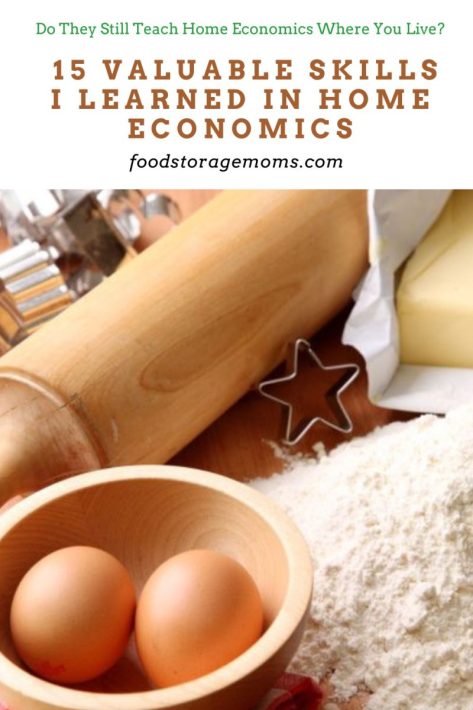
1. How To Measure Ingredients
Do you remember learning how to measure flour for instance? We were taught to use a knife to scrape across the top of the measuring cup to level the flour, right? I never liked doing that so I stopped. I scoop my flour, what do you do? I make bread and I’m not going to scrape 14 cups of flour, just giving you the heads up. I have to giggle about the leveling, it’s who I am. Keep using a knife if it works for you, my friends.
2. How To Sift Flour or Powdered Sugar
Yes, I have a sifter, but I rarely use it. I bought it just in case I need to sift flour, but in the last ten or more years I have never sifted flour. But, I’m glad I learned how to sift the flour in my high school cooking class. Another very good reason to have a sifter or a very fine strainer, I can use it to “sprinkle” some powdered sugar very lightly over a fancy dessert.
3. Rolled Cookies
One of the most fun classes in Home Ec was when we made rolled-out sugar cookies and we frosted them in so many different ways using cake decorating tips. We piped the edges and so much more. We learned to roll the frosting bag down as we emptied the bag. I had a very patient teacher who loved all the girls in the class.
4. Drop Cookies
One thing that was really nice, I was able to help the teacher show the students how to use two teaspoons to make drop cookies. I can only remember making chocolate chip cookies dropped onto parchment paper that was placed on top of the cookie sheet. Looking back I bet a lot of the girls never made any cookies at home. My mom taught me how to cook, bake, and the usual kitchen tricks.
5. Biscuit Making
Did you grow up making biscuits? Several of the girls in my class had never made biscuits. My family made biscuits all the time, we ate them with cream-chipped beef and creamed tuna and peas. Yummy! If you’re nervous to make bread, please start practicing by making biscuits once a week or every two weeks. I can guarantee you we’ll need to make biscuits when things get tough.
6. Sewing/Mending
I can still see the sewing machines all lined up in the class. Wow, I knew how to sew, but I still learned a lot from my teacher. The students learned many sewing techniques, some were easy as we learned basic sewing skills, and some were very hard as the advanced classes started and we gained more expertise. We learned how to thread a needle, thread a sewing machine, use good scissors when we cut out the patterns on fabric, etc. We also learned how to sew a button on a shirt and how to make a reinforced buttonhole.
She showed us different fabrics and even how to iron different fabric varieties. You only burn a piece of fabric once, right? She even showed us how to clean and oil the sewing machines.
7. Budgeting
I remember a class or two on how to budget. Most of us had jobs and it came in handy. We learned to play with pretend cash, a cash register, start a savings account, how to apply for and use credit cards, and how to manage our checkbook. Debit cards weren’t a thing back then, but the principles are pretty much the same. It was great training on how to start with this much money and then begin to subtract expenses. It was a great experience to gain some financial literacy regarding personal finance. These were all valuable practical topics for young adults to learn before facing the real world of families and finances when going on our own.
8. Manners
I was lucky enough to have learned most manners at home, but some of my classmates and other young people in my school didn’t know. We were taught to say, “please, thank you, and excuse me.” Some of these things we may take for granted until we see a child who has no manners. Home-taught lessons often last the longest, but I appreciated what our teacher passed on to us.
I’m surprised when I see how boys and girls interact these days. Maybe it’s due to all the time they spend online, but common courtesy seems lacking. The language I hear in public places really amazes me too. I also feel that young people these days can learn some better communication skills since we have so many options to communicate with family, friends, and others. Manners as part of basic life skills have taken a hit over the past few decades!
9. Table Setting Etiquette
Do you remember taking a test on where to put the different-sized forks, spoons, and which way to turn the knife blade in the table setting? Or where to put the glass, at the tip of the knife? We learned how to fold napkins. I swear this is why I love a beautiful table set with nice dishes when serving guests. It was critical that we learn where to put the bread plate and knife and never touch that dessert fork until dessert was served. Life was good in those classes as we learned basic skills.
This is the best Infographic I could find, and I love purple. This gives you an idea of where to put forks, knives, spoons, and goblets. Please keep in mind I’m not this fancy, but I do like my silverware where it’s supposed to be placed. And I can’t eat a meal without a napkin on my lap.
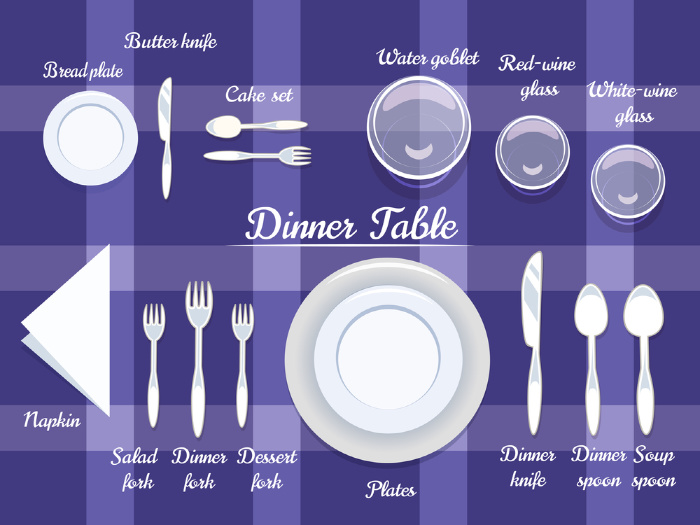
10. How To Use A Pancake Turner
This may sound really funny, but it takes practice on how to flip a pancake, a grilled cheese sandwich, or make over-easy eggs. We learned how to do all of this since she felt it was part of learning important life skills we’d use each day. The neat thing about learning stuff like this at school was that the school had the resources and tools so we could take a practical and even my technical skills approach to learning. My home economics teacher was one patient teacher.
11. Laundry
The school had a washer and dryer and we were taught how to wash the aprons, dish towels, and rags. I’m sure there were a lot of girls that didn’t know how to even start a washing machine before they took that class. I taught my kids at a young age, about 10 years old, how to sort out the clothes by color and type of fabric so they were protected during the washing process. I think this helped prepare me, and my girls, for some important problem-solving skills since they had to make decisions and follow through.
Some people think these home economic class skills are only for those planning to be homemakers. It bugs me that the term homemaker seems to have a less-than-pleasant connotation these days. I was glad to see some guys my age take these classes since it would prepare them to “share” the responsibilities of home and child care, meal planning using a weekly menu, doing laundry, and taking on assignments often thought of as “womens'” work. Taking care of things around the house doesn’t need to be gender specific.
12. Cleaning Tips
We were instructed on how to clean the kitchen countertops, stovetops, and refrigerator. We had to wash the items we used and then let them dry in dish drains. No dishwashers back then.
It’s funny to see our own kids try to give the grandkids instructions on how to keep their bedrooms clean and organized. I feel they are pretty good instructors, but having their kids follow those instructions is another thing! I’m glad I learned many of those skills at school at a fairly young age so I could incorporate them into my daily routine. I tend to be a clean freak, as Mark can attest!
13. Personal Hygiene
One critical item my teacher taught was to always wash our hands before starting to prep any meal. It’s the little things that make it so important to stay healthy in every area of the house. Wash your hands, wash your hands, and wash your hands again.
14. Cutting Board Safety
I can still remember being told to use one wood-cutting board for meat, one for vegetables, one for fruits, and one for bread. We learned about the different bacteria and cleaning the boards with hot soapy water, and oiling them when dry. Little did I know that it would last me a lifetime in the kitchen. As mentioned, I’m a clean freak, and yes, I own it.
15. Cooking
I remember learning to make white sauce, gravy, mashed potatoes, and deviled eggs. Having great memories in Home Economics helped make me the cook I am today. We did spend some time learning about the importance of nutrition as part of meal planning. I harp on my blog all the time that all of us need to learn the skills of cooking from scratch. Eating processed foods, foods from the drive-through, and not eating enough fresh fruits and veggies have all contributed to so many in our culture struggling with obesity. Eating healthy foods was taught in my classes, and my mom must be given a lot of credit as well.
Final Word
I really wish the states that dropped the Home Economics classes will eventually bring them back to the classrooms. It’s a real shame that some of our youth may not learn these skills we all need to survive. Yes, survive. When we have a grid down, and we will, there will be no laundromats up and running, and the fast food drive-throughs will close down in the short term. My wish is that everyone can teach each other to do at least half of the skills I have listed today. Please keep prepping, we must be diligent. May God bless this world, Linda.

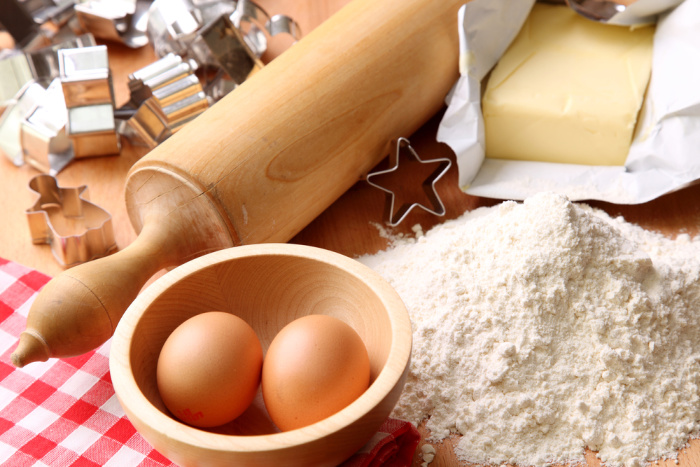

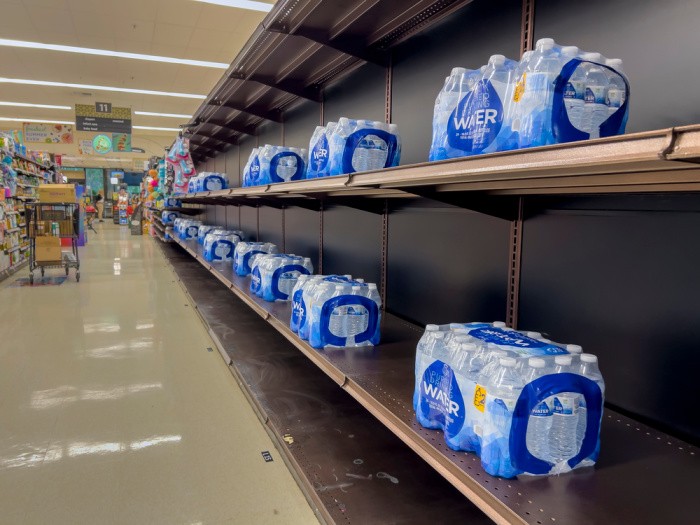
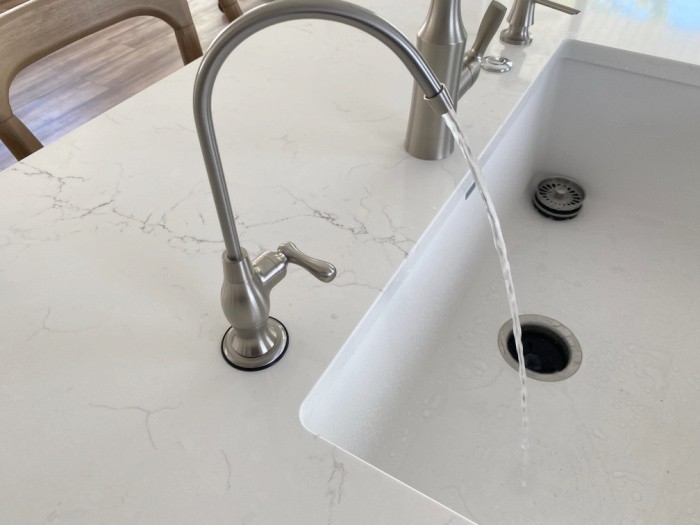
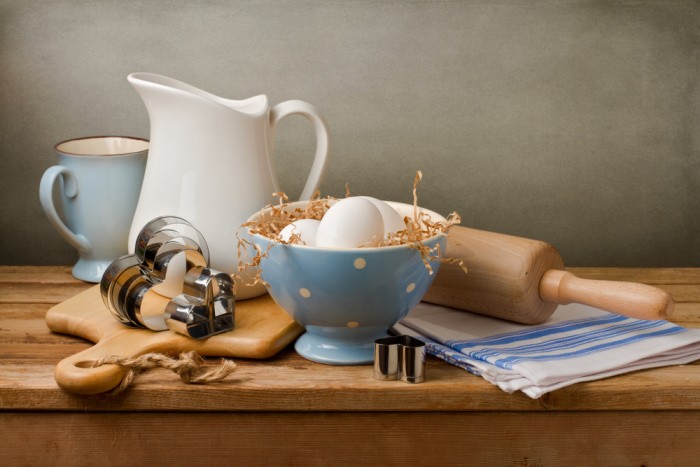

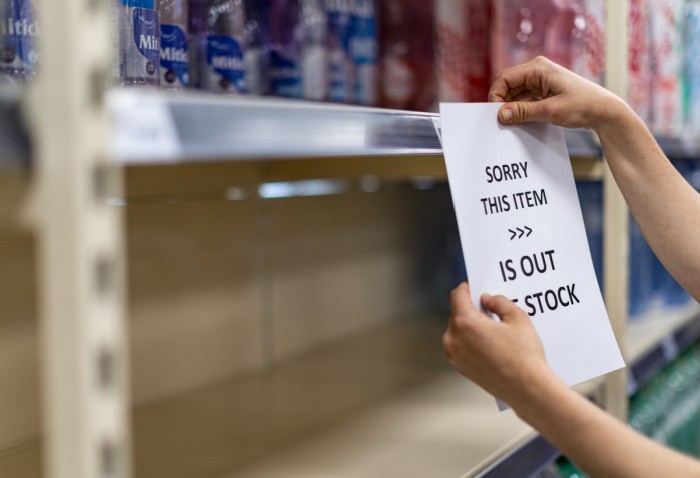
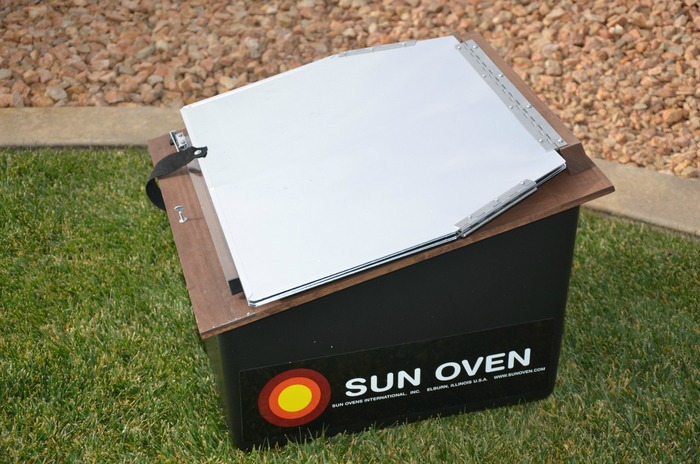













Thank you Linda, I to hope Homes Ec is added back to the curriculum. I have no idea why they dropped home ec in the first place.
In the South, our class was taught to read a recipe, fry a variety of food, how to tell when fruit and vegetables are ripe. These are just a few of the things I remember.
Patricia Dolan
Florida
Hi Patricia, oh my gosh, yes we learned to read a recipe!! What you learned about how to tell if fruit and vegetables are ripe is awesome!!! I really wish they would bring Home Ec back. Everyone needs to know how to fry food, bake food, and cook different meals. We can only hope they find a way to do it. Maybe they could cut some salaries in Congress or whatever and spread the wealth where it really needs to be. Thank you, Linda
I was very fortunate in that I learned almost everything Home Ec taught but learned it at home before I even got to High School. My mother was a wonderful homemaker and taught all of us girls (I have 3 sisters) how to sew, cook, bake, make candy, do laundry and can (fruit, veggies and meats). I also had another advantage in that my oldest sister was a Home Ec teacher but not the one I had in high school. As for reading a recipe, my mother said that if you could read, you could make whatever recipe you wanted!
The teacher I had was terrible. She was great at the sewing classes but not the cooking classes. She loved to eat what we made but for those of us who did learn at home, she didn’t teach us much. For those who did not learn at home it was probably great but…
I think what I learned from her that I recall was to sew a lined wool suit. I still remember that suit!! It was tough but it turned out great.
My daughter had a class in high school that was not called Home Ec but was called Paths. Each student got to choose what they did. My daughter chose to learn how to cook (even though she learned from me) and how to sew (which she didn’t learn from me). She made a beautiful bed sized quilt which she gave to me. She did learn how to make some things that I didn’t cook – lasagna being the most remembered! She was not one to eat pasta dishes other than noodles with butter and cheese but no sauces and especially no sauces with meat! One day she came home and said she had learned how to make lasagna. That weekend, she made some and she was so thrilled that she loved lasagna and made it frequently. I think it opened up a new world for her.
Anyway, I do think that those skills do need to be taught and if not at home, then certainly in school. A grocery store really close to me holds cooking classes for both adults as well as kids. They have a kids summer cooking school. It is pretty expensive to take those classes but they are available. In the adult classes, you are taught not only how to cook the food but also what wines or adult beverages to pair with those recipes.
Hi Leanne, I love your comment. You and I were lucky to have a mom teach us so much before we started school. It’s sad that others maybe didn’t luck out as we did! If fast food establishments close, yikes! Where I live the lines in those fast food places and restaurants are packed. It’s hard for me to understand, but I love to cook and eat at home, so that’s what I do. I love the lasagna story!!! Linda
Boys need these skills just as much as girls do. My son had a course in “living skills” where the class learned budgeting, food preparation and getting a food handling license, cleaning, and other things. No sewing but it would have been good to know how to sew on a button, mend a seam by hand. Men need to be able to pitch in when their children are born and growing up, do the dishes, cook a meal, vacuum and teach kids manners. Women mostly work out of the home and need a real helpmate on the home front.
HI Linda, great comment, I totally agree! Two of my grandsons took sewing classes before they cut them. We really need everyone to learn these skills. Linda
I agree with you about what a pain it is to have to use a knife to level the flour! I solved that many years ago. I use a large scoop that has a straight bottom. I scoop the flour into the measuring cup, then level it off with the bottom of the scoop!
We had a separate class that taught manners, table settings and the like – it was called “Charm”!!
Hi Kathie, oh my gosh, “Charm.” I love it!! The knife leveling, oh my gosh, love it! Linda
Hi Linda. I must admit I never really enjoyed my class. (It was known as Domestic Science at my school in England, but Home Economics here in Australia.) Our teacher was quite elderly and seemed to spend inordinate amounts of time telling us how wonderful her son (Robert? Roger?) was. We all thought he sounded dreadful and luckily we never had to actually meet him! I remember learning to toss pancakes and having the headmaster (you’d say principal I think) eat mine afterwards. I never liked them (still don’t) but he said they were very good which was nice, but a bit embarassing when you’re 13. We all had to make our own aprons and caps before we began to learn to cook, and sewed our own summer uniform dresses, too. Every week we had to write out the next recipe in our notebooks, so we’d know what to bring for the class. You could always tell who had a cookery class because we had lidded baskets to carry our finished product home at the end of the day – so Mum could pronounce judgement in my case! She frequently disagreed with my class teacher about the kind of things we were taught. In her day, her school had a real apartment where the girls learned to cook, clean, mend, etc. It must have been the cleanest apartment in the world – no-one ever lived there but it was thoroughly cleaned every day of the school year!
Hi Pat, wow, that would be hard to have the headmaster or principal eat my pancakes!!!! It sounds like you learned a lot more than I did. You sewed your uniform dresses, aprons, and caps. I had to laugh about the cleanest apartment, no one lived there!! Love it! Linda
What a great post and it took me down memory lane!!! I majored in Home Ec. and took every single class available. All of those skills I learned like many of you before I got to Home Ec. My mother didn’t particularly like to do these things but I had a grandmother that I stayed with most summers and she taught me so many skills. I was baking bread, making sauces, and knitting, sewing, crocheting from a very early age. She taught me how to sew on a treadle machine before I was allowed to work on the electric one! She was a master at knitting and crocheting. She sat with a basket of fine work on her lap in the evenings working at doilies, booties, or hats. I totally agree with learning how to read a recipe, and to read it a couple of times before deciding to make it so you know if you have the ingredients. In recent years, I taught three little girls how to make food recipes, and I emphasized how important math is. You have to know how to increase and decrease recipes depending on how many you are cooking for. On the front of my recipe binder I keep a chart of kitchen measurement conversions, i.e. how many tablespoons in 1/4 cup. It is very helpful. Knowing how to adjust recipes, substituting things and knowing how it will affect the recipe is also important. Because my grandparents lived far from town, they kept a pantry stocked with the essentials for cooking from scratch. One thing that a lot of people are not familiar with is how to mend things. I mend socks several times before they wear out. I cannot afford to run down to the local store to buy another sweater because the one I have been wearing for years has a hole in it. This will be a very important skill when the grid goes down.
Hi Carol, I’m often very surprised when I hear someone doesn’t have a sewing machine. I mend everything on my sewing machine. I could hand mend it as well, but while we have electricity I’ll use my machine. I really loved reading your comment!! Thank you, Linda
Such a pity that schools get political in what they teach rather than think of the students. I recall growing up and the message was work to make money and utilize services for the mundane tasks. And that mundane tasks were not as important as the chase for success, money, education and promoting new technology.
Now we have people that can’t take care of basic needs and those who focus on mundane tasks and ancient skills or “the old ways” are actually happier and save money because they have rediscovered the value or living versus all the artificial concerns that have been presented to us as more important.
I’d sure feel silly talking to an alien (If they exist) and trying to explain I can operate a vehicle, but can’t wash my clothes or make a meal. “You humans are so illogical”.
Hi Frank, oh my gosh, best comment ever! It really is a pity, Frank, that political issues or whatever have taken out the one thing that is critical for survival. It’s all about knowing how to wash clothes, cook from scratch, and read a recipe. I only wish they had taught me how to work on a car when I was in high school. That class was off-limits to girls. Darn! You and I know what’s really important in life. Great comment, Linda
Linda,
I grew up in a little farm town, our Home Ec class was basically 2 parts. One cooking and one
sewing. Out here Table Etiquette was to make sure we had plates and silverware on the table, didn’t
really care how they were put on either as long as they were there. I am with you on the leveling
off the flour, I don’t do that never have. I only use my sifter when I make homemade Angel Food cake.
I do love making Biscuits and put gravy on them, or just butter and homemade jelly. I eat something
a lot of people would go yuck over. When the fresh home grown tomatoes come on I love them with
gravy on them. Needless to say I’m full on country. I wish they did still teach Home Ec in school, the
kids ( not just girls) need to know how to do things. Most kids don’t know how to do wash or do
dishes. We never had a dishwasher growing up and that still doesn’t appeal to me. Just do them
by hand.
You mentioned Personal Hygiene, I had to laugh. I used to work for the University
and the International students some didn’t take a bath or use deodorant, summer time was a
little challenging as we worked hauling books and putting them on the shelves. Home Ec. would
have come in very handy for ALL at that time.
Hi June, yes, you are full on country! I love it, I never thought to put gravy on some tomatoes! I remember now making an angel food cake from scratch, of my gosh, all the egg whites and the sifting!! I really wish the schools would teach Home Ec. It taught skills and teamwork. Great comment, Linda
I think my own mom felt that having her teach me cooking or sewing would be like dad teaching you how to drive! So until home ec I did mostly farm chores (including hand-milking). I do remember that my home ec teacher was wonderful about using mistakes as learning opportunities–if something spilled, you learned tricks for easier clean up; if you didn’t have an ingredient, you learned substitutions; if you made a sewing mistake, you learned how to use the seam ripper–and so on!
I *do* remember one assignment in “personal grooming”–ten things you’d do for good care of your hands. Naive farm kid that I was, my list included such things as rubbing soap under your nails before tackling a dirty job; use of Lava soap; vaseline to prevent hangnails… The teacher read a few of the items as she collected the papers, and I began to realize that I’d gone in a completely different direction than, ah, “charm” hand care probably dictated! However, when the teacher picked up my paper–although she momentarily skidded to a verbal halt in obvious surprise–she validated my responses!
Hi Rhonda, I bet you learned a lot in that class but it sounds like the teacher and other students may have learned a lot more from you. Life experiences go a long way. When you started talking about the Lava soap, that brought back memories for me. I learned today about using vaseline for hangnails, so there you have it. OH, and the beloved seam ripper, I can’t live without one! Learning how to substitute a few foods for other foods in a recipe is a blessing, truly a skill! Great comment, thank you!!!! Linda
Hi, Linda–vaseline for the hangnails was then–now I use Badger Balm! The Lava soap is still here, though! (I’m still doing farm chores, although I’d rather not go back to milking…)
Hi Rhonda, I have seen that Badger Balm, I need to check that out! Thanks for the tip!! I’m jealous in a good way you have a farm, I have always wanted to have a farm, my husband not so much. You are living the dream! I love it! Linda
Badger Balm has a good website, and periodic specials (which is when I load up for the year). The company seems to be an excellent one–honest, conscientious. And, they have a load of workshops throughout the year–they’re not all that far from us, in Gilsum, N.H., but darn, the workshops I want always come when *I’m* out straight!
Thanks, Rhonda, I’ll be looking for this group!! Linda
aaaaaaaaaaaaaaaaaaaaaLinda,
This is an interesting article to which I will add a few more comments and techniques that I have found useful.
1. How To Measure Ingredients
I also used and use measuring cups & spoons; but, for some things we find a digital kitchen scale saves both time & cleanup. Today many recipes or ingredients on cans and boxes, list the content by weight in both oz & grams. We set the scale to grams for finer resolution & control, place the mixing bowl on the scale and hit the ”Tare”</strong or <”Clear”</strong? button to zero the scale with the bowl in place. You then start adding dry ingredients. Add for instance the proper amount of flour by weight, then clear the scale and move on. When you’ve added the final ingredients, take the bowl off the scale and mix them. Since there are 28.4 grams per oz, you can get really accurate measurements and not have to clean anything but the mixing bowl or perhaps a few spoons if you need to measure baking powder, baking soda & cream of tartar or some small quantity of spice like cinnamon.
2. How To Sift Flour or Powdered Sugar
Like you, I haven’t sifted flour in a long time, and all of the recipes requiring sprinkling of sugar or other ingredients works fine with two spoons, or a pinch between the fingers.
4. Drop Cookies
Our favorite two cookies are toll house and Snickerdoodle that both fallinto this category; however, the toll house are really the only true drop cookie, while the Snickerdoodles are made into balls and rolled in a cinnamon and sugar mixture.
I was taught by both mom & dad who were both good cooks. Growing up things like TV dinners or pot pies were a rare treat and :from scratch” cooking was the norm, since it’s usually much less expensive.
My folks required me to cook my last few years in high school, since I was moving out of state to college and they knew it would be a good skill to have.
5. Biscuit Making
We also had the cream chipped beef on toast, known as S.O.S. or “something On a Shingle.” lOL; but, what I remember most were drop dumplings.
You can use Bisquick or make them from scratch by mixing
• 1 cup flour
• 2 tsp baking powder
• 1 tsp white sugar
• ½ teaspoon salt
• 1 tbsp margarine or butter
• ½ cup milk
Mix all ingredients
Stir together flour, baking powder, sugar, and salt in medium size bowl. Cut in butter until crumbly. Stir in milk to make soft dough.
Drop balls of this dough into boiling liquid, either a soup stock or my favorite, a mixture of fruit like blueberries with some water and sugar cooked until it’s a bit thick. Cook until the dough balls are cooked through; but, still soft.
6. Sewing/Mending
I can sew; but, usually use iron on patches and have also been known to use super blue to attach a piece of denim over a hole in jeans. I can live with some holes in clothing; but, I detest ill fitting socks or underwear.
7. Budgeting
I think budgeting can go a long way; but, often people don’t know how or don’t bother to balance their checkbook. When the wife or I balance the checkbook, we’ve been known to spend 30 minutes finding a 1 cent error. I know a few people who have a good idea of what’s in the account and don’t bother to keep close track, since they keep a hefty balance. The problem is that a simple mistake and a bounced check, will take them hours & hours to find the problem.
I had that same class many decades ago; but, have mostly learned from the school of hard knocks. Today everyone has a calculator and I use spreadsheets for nearly everything. Last October we purchased a new vehicle, and the lady at the bank was somewhat impressed when after f few months, we when in to get the exact outstanding balance. Any extra money we pay is subtracted from the balance, so I keep track of the monthly balance and interest based on the payments we make, and looking at the balance dropping precipitously with a little extra payment, gives us incentive to save more to retire this one final outstanding debt.
8. Manners
I not only learned manners; but, my grandfather was a high school teacher who taught math & English, so spelling, pronunciation, and grammar were also part of our early life. In my house one did not curse and ”Ain’t” was another 4 letter word.
9. Table Setting Etiquette
While I know how to do this, we rarely worry about such things, since serving good tasting and high quality food normally makes people forget which fork to use next
I do BTW, keep a napkin on my lap (actually the knee) to wipe my fingers, since the wife will yell or hit me when I wipe them on my pants, LOL.
10. How To Use A Pancake Turner
We have always called these Spatula’s and have them in different materials and different sizes. Turning pancakes takes a larger (wider) version than one for French Toast or grilled Cheese sandwiches.
11. Laundry
I did my laundry in college and while I was single; but, for the most part, the wife doesn’t want me touching anything in the laundry area since I always seem to get in the way. We’ve been married 37 years and except when camping, I rarely do laundry any more.
12. Cleaning Tips
No dishwasher now either, unless you count the wife. LOL
I have offered many times; but, she simply doesn’t want one.
13. Personal Hygiene
You also may be doing this several times while preparing the meal. I like working with my hands to do things like mixing ground beef, onions, oatmeal or bread crumbs and other things for meatloaf and do the same for other mixtures like cookie dough’s. Often I can just do a better job with my fingers.
For avoiding influenza, other than vaccinations, hand washing is your #1 best defense.
14. Cutting Board Safety
Since the cuts and crevices that can hold food may not get completely cleaned, cutting boards made from wood may actually be safer. Bacteria with some food and moisture in cut plastic can independently live quite a while; but, wooden boards tend to dry out instead of holding the moisture, and will eventually dry out the bacteria in those cuts, killing them. One still needs however to use proper sanitation at all times.
15. Cooking
Same here with both of my parents who taught me to eat almost anything and treat :failed” recipes as learning experiences. Don’t add as much salt next time or perhaps add a bit more cinnamon which works when you mostly cook to taste.
Hi Ohio Prepper, I love your comment as always! It sounds like we learned so much of the same skills, recipes, and whatnot growing up. Life is good for us!! Happy weekend! Linda
I was blessed in that I was taught to cook, sew, wash, iron, fold, etc. at home by my Mother and Grandmother (my Father taught me to hunt, read sign [track] and everything I needed to know in the wilderness). I still have the Singer treadle machine my Grandmother taught me to sew on (today I only use it to sew canvas, webbing, and leather). Boys weren’t allowed to take Home Ec, when I was in high school (btw, our Home Ec. Teacher was Miss Cook, the teacher Bonnie and Clyde kidnapped).
Thank you Linda for this website.
With a brother’s love,
CB
PS: I miss The Ohio Prepper. He was a blessing to all who knew him. He and I have had 4 disagreements and I was right on one of them.
Hi Curley, boy you were blessed to learn all those skills from your mother and grandmother. Your father taught you to hunt and track, what a blessing that was!! I remember boys could not take Home Ec in school and girls (me) could not take woodworking. Miss Cook, what an awesome story, I love it! I have not heard of The Ohio Prepper, I’m glad you were right on one of the disagreements! Thank you for your kind words, stay safe, stay well. Linda
Linda, look back 2 comments and there he is. TOP has been a contributor on this site for some time.
CB
Hi Curley, oh my gosh!!! Now I remember! Thank you!!!!! Linda
That’s why I taught BOTH boys how to cook, sew and PROPERLY clean. (IE The bathroom,LOL) My MIL did the same with her(5) boys before she had my SIL.She told them their wife wasn’t a maid so they better learn to do for themselves and help their wives .
Just wanted to say Hello, It’s been very busy here. Our oldest grand daughter graduated from HS down south so we traveled there, went to see my sisters on the way home for a few days then to see my BFF in Pits. Now we are in the midst of some renovations (House is over 35 yrs old, we are the 3rd owners) Bathrooms are original, we’ve only done cosmetics over the years but we needed to replace things ( so Son2 doesn’t have to when we pass). You know, get newer low flush toilets, a new tub, old one has a floor slanted so bad that you felt like you were pitching head first into the shower head wall. Our bath just needs a new toilet and cabinetry (wallpaper and paint) as we did the walk in shower a few years ago when we did the floors. Hope everyone had a fun and safe 4th.
Hi Kathy, what a blessing the boys you raised with those skills!Your MIL did as well, yay! When I see a dish in the sink I have always said, we do not have maid service here, so all dishes must be loaded. It sounds like you have had a great time so far this summer! Yay to visit your BFF!! We’re still in the midst of our build, so I hear you on renovations. It’s hard but will be so worth it. Our group is installing heating and air conditioning stuff today. We’re heading to see our grandson get married on Saturday. Life is good as the new generation grows up and makes their own book so to speak. Linda
Linda – it is always good to revisit older posts!
I don’t measure or level flour in standard measuring cups. I started using a digital scale and find I have much better accuracy. When I run across a recipe that doesn’t have weights, I do measure the ingredient (flour, sugar, etc.) and level. But then I weigh it. Now I have a chart in my recipe file with pretty standard weights for my dry ingredients. This helps me standardize my baking/cooking. AND it also allows me to make foods from other cultures where the standard is by weight – I don’t go crazy or have to look up what a weight is in cups/teaspoons or tablespoons. Fortunately, many (or I should say most) measuring cups in the US also have the metric measurements for liquids. So that eliminates having issues with making those dishes. Also, since I live alone and need to cut recipes down to eliminate too many leftovers, weights seem to be more accurate than trying to measure 1/8 cup for example.
I spent a couple of weeks back in January taking care of 4 of my grandchildren (ages 11 1/2, 9 3/4, 8 1/2 and 4 1/2). During that time, I taught some basic cooking skills that my daughter doesn’t have the time nor patients to do (has a new born baby – well he is 5 months old now). I have also taught my now 10 year old granddaughter to sew a little – she made a doll quilt that she tied and made some other small sewing projects. When I get moved to be closer to them, I want to teach her to make an apron for herself. That was the first project my mother taught me.
Hi Leanne, I agree, I like to repost some old articles and update them. I have never gotten into the habit of weighing ingredients. I know people swear by it when making bread. I guess I’ve made bread for so many years the measuring cups still work for me. But I like a challenge, I need to try this idea. Oh, the granddaughters and the doll quilt, love this! My first sewing project was making an apron too! The gathering with three rows of stitches, or may be two rows I can’t remember. Keep us posted when you hear if you get that house you are hoping for, it will be so nice to be that close to the grandkids! Linda
Hi Linda, I had home ec in middle school. I am 62 but our high school had already cut “electives”.
Luckily My Dad loved to cook and showed my sister and I all the basics. My Grandma taught us to bake. And can/dehydrate food. And my Great Aunt how to run a sewing machine.
I married a military man who knew how to hand sew really well and BONUS could iron like no ones business! I do feel blessed to have grown up in and married the family I did.
Hi Hazel, oh I love this comment! You were truly blessed to have all the teachers/examples that taught you the skills you have!! The BONUS, iron, you scored big time! I love this! Linda
Had to chuckle when I read the setting the table section. Years ago we were on a cruise. We sat down to a formal dinner on our 2nd night. A man at our table asked what the heck all the dinnerware was for (he was a bit more explicit). My then 16 year old son proceeded to name each plate, glass, & utensil and explain what it was used for (including the snail & oyster forks as well as the different wine glasses). The whole table full of people were sitting with their mouth agape. My kids were taught well!!!. I was so proud of him.
Hi Rebecca, oh I LOVE LOVE LOVE this story! I can visualize your cute grandson explaining each piece of silverware. Proud mama! Linda
Linda, I absolutely loved reading about your home ec experience and your teacher!
I started sewing when I was 12: my Mom was an excellent seamstress and made all of our clothes for years. So at 12, I declared I was making a skirt and blouse, and Mom helped me if I got stuck, it turned out okay enough that I could wear it to school. My home ec teacher knew that I sewed (I would go to the nice department stores to see what the latest fashion was, then make my own with whatever similar pattern I could find), so she challenged me to make a women’s wool suit, and I mean ALL of the details that involved….whew…it was hard!! So when that was a success, thanks to my dear teacher, I went on to make a raincoat and a couple of men’s suits, as well as clothing from Vogue patterns. Her insistence on details ended up winning me a couple of contests later on when the competition was so close, the judges had to go to the inside and look at our inner work, and my inner work was very correct from the guidance of my dear high school home ec teacher. Memories!!!!
Also I do love to cook but other than a few new basics in home ec, I learned how to cook and do canning by watching/helping my Mom and Grandma.
Hi Janet, oh my gosh, your comment brought back so many memories!! I remember making a wool jacket full length. OH, and I remember using some herring bone fabric and I had to make the darts (lines) match up. Your experience sounds so similar to my teacher pushing me. My mom taught me to sew but my Home Ec teacher pushed me in a good way to do better. Best class ever! Love this, Linda
Love this, Linda!!
I remember my Home Ec classes which started when I was in the 7th grade in 1960. My first class was cooking, boys were in our class also. We had to make up a menu for 1 week, 3 daily meals plus snacks. The best Home Ec class was Millinery (Hat making) where we learned how to make hats. I made berets to match the outfits we made in sewing class. I had sewing classes for 3 years, cooking classes for 2 1/2 years in both Junior high and High school. They stopped the classes in New York City schools in 1966. I agree they need to start the classes again, although my Children and Grandchildren all can cook and take care of a household because I taught them. Now if only I can get them prepared for emergencies, I will be a happy camper.
HI Mildred, oh I love hearing about the classes and the amount of years you were taught in school in Home Ec!! Making hats, sewing, cooking, squeal!! I love hearing this! I have to agree with you getting our kids and grandkids preapred for emergencies is much harder. Not sure why, It’s natural to you and Me! Linda
In my era, Home Ec wasn’t offered to guys. We too wood shop instead. But If they added how to handle family and personal finances to Home Ec it would be even more useful–for both boys and girls. I remember some of the girls talking about learning how to bake cookies but no one said anything about learning how to handle money (budgeting, balancing checkbooks, etc.)
I learned most of that stuff from my grandma, mom and trial and error–though I learned how to cook fish and game when hunting and fishing with my grandpa.
Hi Ray, oh you are so right, it would be nice if they would teach budgets and balancing accounts, how to save money at school, etc. Yes, we as parents can teach it but sometimes teachers can do a better job, then we wouldn’t have to deal with the eye rolling!! LOL! Linda
Linda:
When I was young and I was in Girl Scouts they took us to the Electric company and they had classes in cooking where I lived then. I don’t know if they have those anymore either. I think it is part of their let someone else do it for you. I even took cooking classes In High school that were meant to teach you to become a chef. I don’t think that they do that anymore.
Hi Jackie, wow, classes in cooking would be so awesome. Becoming a Chef would be fantastic! I’m not sure they do cooking classes in schools here in Utah or not. I know I have asked my grandkids and they had never heard of those classes. Linda
Food Storage Moms – “These 15 valuable skills from home economics take me back to my school days! In today’s fast-paced world, it’s crucial to master these fundamental skills for a self-sufficient and sustainable lifestyle. I particularly resonate with the emphasis on cooking basics and budgeting—essential skills for anyone looking to navigate the kitchen with confidence and financial savvy.”
Hi Donehousewash, you are so right, we must teach our kids and grandkids these very critical skills to survive/live on their own. Linda